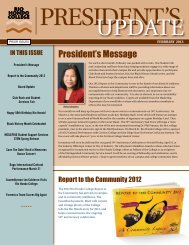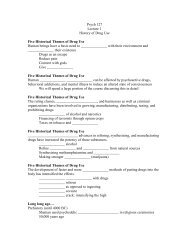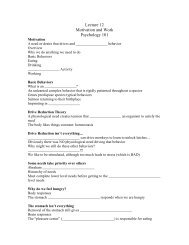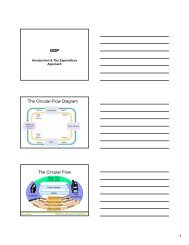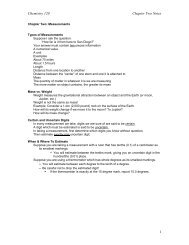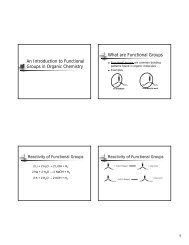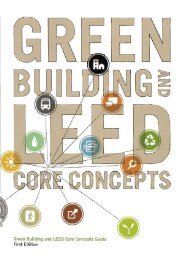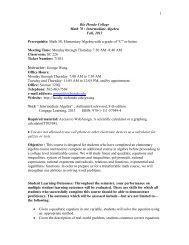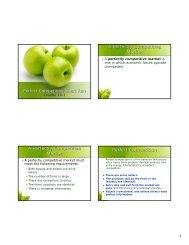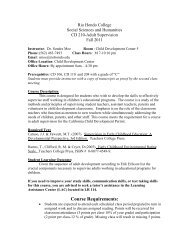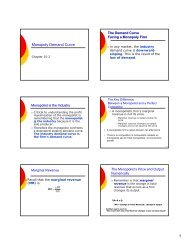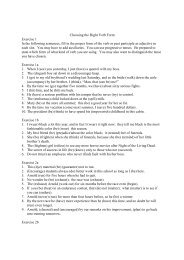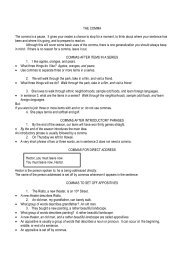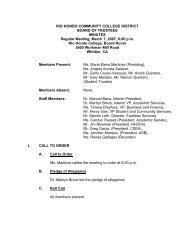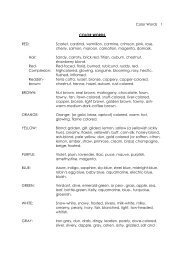Complete College Catalog 2011-2012 - Rio Hondo College
Complete College Catalog 2011-2012 - Rio Hondo College
Complete College Catalog 2011-2012 - Rio Hondo College
You also want an ePaper? Increase the reach of your titles
YUMPU automatically turns print PDFs into web optimized ePapers that Google loves.
AUTO 135<br />
Advanced Clean Air Car Course<br />
Advisory: ENGL 035 or ESL 198 or<br />
appropriate assessment; READ 023 or<br />
appropriate assessment; MATH 030 or<br />
appropriate assessment; AUTO 120;<br />
AUTO 130<br />
Transfers to: CSU<br />
This course is intended to prepare<br />
students to take the State of<br />
California Motor Vehicle Pollution<br />
Control Enhanced Area License<br />
Examination (I/M Test). This course<br />
is a combination of the Advanced<br />
Emissions Diagnostics Update Course<br />
and the BAR 97 Transition class.<br />
Course content includes: customer<br />
awareness, five gas analysis, catalytic<br />
converters, baseline techniques, scan<br />
tool and lab scope use, and practical<br />
application of loaded mode (smog test)<br />
emissions testing. Proper diagnosis,<br />
testing, services and repair of all<br />
emissions systems will be an essential<br />
part of this course. This course is one<br />
of two courses that qualifies students/<br />
technicians to meet the Bureau of<br />
Automotive Repair requirements for<br />
the State of California Enhanced Area<br />
Licensing Examination preparation.<br />
This course may be taken once<br />
for credit towards the certificate<br />
and repeated twice to enhance the<br />
student’s skills and proficiency.<br />
2 Units<br />
18 Lecture hours<br />
54 Lab hours<br />
AUTO 138<br />
Fuel Injection Systems II<br />
Advisory: AUTO 110; AUTO 128<br />
Transfers to: CSU<br />
This course is designed to provide<br />
the student with the fundamentals of<br />
pre and post-OBD-II Bosch Engine<br />
Management Systems related to<br />
Bosch-equipped vehicles. Students will<br />
learn how to use Bosch-specific tools<br />
and equipment, and how to safely<br />
perform basic repair and maintenance<br />
operations. Emphasis will be placed<br />
upon the L-Jetronic Systems, Digifant<br />
Systems, and Motronic Systems.<br />
Service Information Systems, Electrical<br />
Circuits, Symbols & Circuit Diagrams,<br />
and other related topics will be<br />
discussed. This course requires the<br />
students to have a solid background<br />
regarding the technical knowledge<br />
of basic Gasoline Engine Fuel and<br />
Ignition Systems as a prerequisite, and<br />
is required for the proposed Bosch<br />
Certificate Program.<br />
3 Units<br />
54 Lecture hours<br />
AUTO 140<br />
Body and Chassis Electrical Systems<br />
Advisory: READ 023 or appropriate<br />
assessment; AUTO 057<br />
Transfers to: CSU<br />
This course provides an overview of<br />
the modern automobile’s electrical<br />
system as related to the body and<br />
chassis of the vehicle. The theory of<br />
operation, operational characteristics<br />
and methods of problem diagnostics<br />
and repair for the following systems<br />
are included: lighting, instruments,<br />
windshield wipers, power windows/<br />
seats/mirrors, audio systems,<br />
convertible tops, safety restraints,<br />
and anti-theft systems. This course<br />
prepares the student for the (ASE)<br />
Automotive service Excellence A-6<br />
exam and is intended for Automotive<br />
majors. This course may be taken<br />
once for credit towards the major and<br />
repeated one time to enhance student<br />
skills and proficiency level.<br />
4 Units<br />
54 Lecture hours<br />
54 Lab hours<br />
AUTO 141<br />
Alternative Fuels I<br />
Advisory: ENGL 035 or ESL 198 or<br />
appropriate assessment; READ 023 or<br />
appropriate assessment; MATH 030 or<br />
appropriate assessment<br />
Transfers to: CSU<br />
This is an introductory course on<br />
alternative fuels as they pertain to<br />
use in modern vehicles. Various<br />
alternative fuels will be compared,<br />
such as Compressed Natural Gas<br />
(CNG), Liquefied Natural Gas<br />
(LNG), Hydrogen, Bio-Fuel, LPG,<br />
etc. The theory of operation, system<br />
components, and the safe handling of<br />
these fuels are included. Students will<br />
develop skills in the area of vehicle<br />
preparation, system component<br />
identification, and repair procedures<br />
related to vehicles using alternative<br />
fuels. This course is designed for<br />
students and technicians working<br />
on stationary power engines,<br />
transportation and clean fuels<br />
seeking to improve skills related<br />
to the maintenance and repair of<br />
gaseous fuels. This course provides<br />
students with ASE F1 or H1 test prep<br />
information.<br />
3 Units<br />
45 Lecture hours<br />
27 Lab hours<br />
AUTO 142<br />
Alternative Fuels II<br />
Advisory: ENGL 035 or ESL 198 or<br />
appropriate assessment; READ 023 or<br />
appropriate assessment; MATH 030 or<br />
appropriate assessment; AUTO 141<br />
Transfers to: CSU<br />
This is the second course on alternative<br />
fuel systems used to power modern<br />
vehicles. Emphasis will be placed on<br />
installation, diagnostic procedures,<br />
laptop computers, and computer<br />
monitoring of Compressed Natural gas<br />
(CNG), and Liquid Natural Gas (LNG)<br />
systems. The application of other<br />
alternative fuels such as Hydrogen,<br />
LPG, Bio Fuels, etc will also be covered.<br />
Students will also develop skills that<br />
interface with modern technology<br />
computer based automotive electronic<br />
and network controls. SAE and CAN<br />
network control systems will also be<br />
covered. This course is designed for<br />
the experienced technician working in<br />
the field of stationary power engines,<br />
transportation and clean energy fuels<br />
seeking to improve skills related to the<br />
installation and repair of gaseous fuels.<br />
4 Units<br />
54 Lecture hours<br />
54 Lab hours<br />
AUTO 147<br />
Introduction to Hybrid and Electric<br />
Vehicle Technology<br />
Advisory: ENGL 035 or ESL 198 or<br />
appropriate assessment; READ 023 or<br />
appropriate assessment; MATH 030 or<br />
appropriate assessment; AUTO 140<br />
Transfers to: CSU<br />
This course explores the use of<br />
Hybrid and Electric power for vehicle<br />
transportation. Topics will include<br />
safety when using high voltage,<br />
maintenance, drivability, inverter<br />
power transfer, battery technologies,<br />
hydrogen electric power, and fuel<br />
cell technology. Physics of battery<br />
storage, Hybrid generation systems,<br />
Electric vehicle applications and<br />
their integrated systems from many<br />
manufactures will be discussed.<br />
This course is suitable for student’s<br />
entering into alternative fuels or power<br />
generation and energy technology<br />
field.<br />
3 Units<br />
45 Lecture hours<br />
27 Lab hours<br />
AUTO 148<br />
Vehicle Safety, Comfort and<br />
Convenience Systems<br />
Advisory: AUTO 048<br />
Transfer to: CSU<br />
This course is designed to provide<br />
the student with the fundamentals of<br />
Bosch safety, comfort and convenience<br />
systems related to Bosch-equipped<br />
vehicles. Students will learn how<br />
to use Bosch-specific tools and<br />
equipment, and how to safely<br />
perform basic repair and maintenance<br />
operations. Emphasis will be placed<br />
upon the airbag restraint systems, ABS<br />
and traction control systems, AC and<br />
heating systems, lighting systems,<br />
and theft-deterrent systems, service<br />
information systems, electrical circuits,<br />
symbols & circuit diagrams, and other<br />
related topics will be discussed. This<br />
course is required for the proposed<br />
Bosch Certificate Program.<br />
3 Units<br />
54 Lecture hours<br />
AUTO 150<br />
Engine Electrical Systems<br />
Advisory: AUTO 115<br />
Transfers to: CSU<br />
This course discusses the modern<br />
automobile’s electrical system as<br />
related to the engine and various<br />
engine related systems. The theory of<br />
operation, operational characteristics<br />
and methods of problem diagnosis<br />
and repair for the following systems<br />
are included; ignition, electronic<br />
fuel injection, engine management,<br />
emission control, charging, cooling<br />
and starting. This course prepares<br />
the student for the (ASE) Automotive<br />
Service Excellence A-8 exam and is<br />
intended for Automotive majors. This<br />
course may be taken once for credit<br />
towards the major and repeated one<br />
time to enhance student skills and<br />
proficiency level.<br />
4 Units<br />
54 Lecture hours<br />
54 Lab hours<br />
148 / <strong>Rio</strong> <strong>Hondo</strong> <strong>College</strong> <strong>2011</strong>-<strong>2012</strong> <strong>Catalog</strong>



